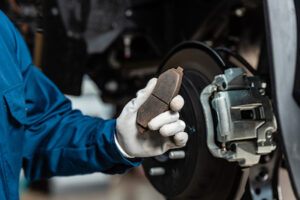Brake Problems You Shouldn’t Ignore
Brake problems can be quite daunting even for the most headstrong of drivers. After all, a fault in your car’s braking system could spell danger. You can avoid most brake problems through regular brake maintenance whereas waiting too long to service your brakes can result in high repair or replacement costs.
Here are the most common signs of brake problems requiring immediate attention.
1. Unusual Noises
Grinding or squealing noises when using the brakes are the first signs that your car might have a problem with the braking system. If your brake pads are worn out, you will hear a loud screeching sound when in motion. The brake pad wear indicator makes this sound when it taps on the rotor.
In addition to the squealing, you may hear a grinding sound, particularly if you have not serviced your brakes in a long time, which can be symptomatic of worn brake pads that need immediate replacement. Your brakes could also produce a grinding sound if the rear drum brakes are not well lubricated.
You should have your mechanic replace the brake pads immediately to avoid damaging the rotor, which itself can be expensive to repair.
2. Mushy Brake Pads
A soft brake pedal is an ominous sign. If your pedal feels exceptionally soft when you brake, you should stop driving to avoid a potentially fatal collision. Changes in the brake’s resistance are usually a result of a leaky braking system stemming from the master cylinder.
usually a result of a leaky braking system stemming from the master cylinder.
The master cylinder contains brake fluid, which fuels the brakes. A leak in the cylinder limits the power transmitted throughout the braking system, causing the pedal to feel squidgy when you brake.
3. Shaking on the Steering Wheel
A jagged rotor can cause vibrations in the steering wheel when you apply the brakes. The rotor is a crucial component of the brake system—it works to slow down the brake pads and in effect, your vehicle. Rotors are prone to wear and tear and can become serrated over time. This inconsistency on the rotor’s surface is what feels like vibrations in your steering wheel.
Leveling the rotor’s surface can stop these vibrations, but this should only be done at a professional auto repair shop. Any little inconsistencies in the rotor’s thickness can cause a shaky feeling in the steering when you brake.
4. Car Pulls to One Side
Like most braking problems, a car that pulls to one side is dangerous, and you should have this problem resolved immediately. Several things can cause your car to behave this way, but the most common cause is a defective caliper. A stalled caliper can go undetected for a long time until your car suddenly starts swerving to one side.
The caliper can become defective if the piston stalls in its bore due to rust and corrosion. If the fluid pressure is unable to push the piston back to its bore, the brake pads will experience uneven pressure, causing the car to pull to one side. You will need to replace the caliper to resolve this problem.
Another cause of a stalled caliper is a bent piston which can tighten the caliper and restrict the flow of pressure to the brake pads. The caliper can also stop working if the slide pins are not well lubricated due to lack of regular maintenance. In this case, your mechanic would need to clean and lubricate the slide pins or replace them altogether.
Your car’s braking system is susceptible to wear and tear, making it necessary to service your brakes regularly. The braking system is also crucial for your safety, and you should, therefore, only work with professional mechanics for any related repairs or replacements.
Contact our expert Tucson mechanics for advice and professional service using state-of-the-art equipment for all types of auto repair services.
